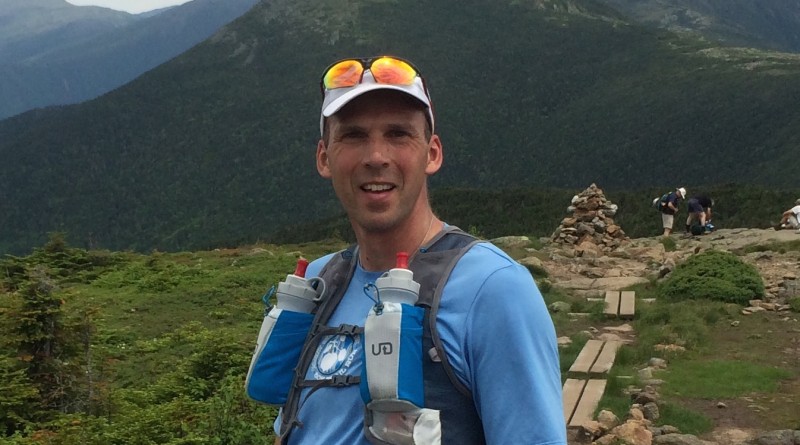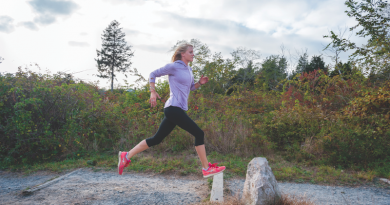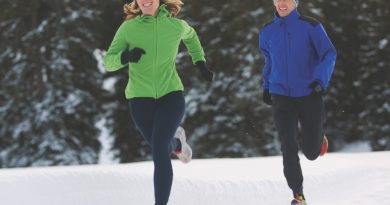Q/A: Craftsbury resident plans Iceland run for this summer
Craftsbury Common — This June, Pavel Cenkl, plans to go the extra mile to highlight the effects of global warming — 171 extra miles, to be exact. Cenkl, 43, an environmental humanities professor at Sterling College in Craftsbury Common, is planning on completing a 275 km (170.8 mile), three-day, solo run across Iceland to highlight the growing prevalence of climate change and the role outdoor athletes and adventurers have in raising awareness.
“Climate change impacts all of us, but athletes have a unique relationship to the outdoors,” Cenkl says. “And we have a connection to our changing climate through the daily choices we make about how and where to travel, what equipment to use, and how we choose to support climate resilience initiatives.”
Cenkl chose the tiny island country of Iceland to make the run, were he plans to follow an ancient Viking path along trails and roads. The landscape will feature rivers, waterfalls, glaciers, thermal springs, and high desert. Cenkl chose Iceland for this project because “the Arctic is among the places on earth where climate change is most apparent and most pronounced,” he says.
Cenkl, who lives in Craftsbury with his wife and son, spoke with Vermont Sports about his goal for the run and the role outdoor enthusiasts play in advocating for a sustainable future.
Vermont Sports: How long have you been a long distance runner and where does your interest in distance running come from?
I guess it depends on how you define that. I’ve been running my whole life, but not competitively until I was well into my 20s. It was nothing I did in high school or college. What I’m most interested in is running in the mountains over longer distances. It was a natural extension from running and hiking with my family and working with the Appalachian Mountain Club for several seasons. It was a natural means to get places faster.
I worked at the Pinkham Notch hut for my first summer in 1988. Then I worked at a number of other huts in the years that followed, like Mizpah, Lake of the Clouds and Zealand. In the summer time, they’re full service huts and people pay to stay there, get two meals a day and a bunk. Part of the job is to make sure everyone is safe, but another side of it is packing the food in, cooking and things like that. In the wintertime it’s a little bit slower and a bit calmer. In a hut like Zealand you can go skiing every day.
A couple of years ago I started getting into longer races. Right now, the longest race I’ve done is a 50-miler, which is the approximate distance I’m projecting to do on the trans-Icelandic run per day. I’m also hoping to sign up for the Leadville 100 in the coming year. It’s something that’s been on my mind and I think I’m ready to take the next step.
VS: Why Iceland and why now?
PC: There’s a growing consensus, a realization that climate change is an actual thing that impacts places like Vermont and certainly even more so in the Arctic regions. We’re seeing villages on the Alaskan coast needing to move because of changes in the surf actually washing away parts of the town. We see glacial decline the whole world over, which has a significant impact on mountaineers and adventurers. The residents that live in those areas depend on some of those glaciers for a water supply. Iceland, too, has seen significant glacial melting over the past couple of decades.
I like Iceland because I taught a course there in 2007 and I traveled there before then. It strikes me as a wonderful place symbolically because it straddles the North American continent and the European one. The mid-Atlantic ridge goes right up through Iceland and it straddles the Atlantic Ocean and the Arctic Ocean. It’s kind of between a lot of things and it’s in a central location. It represents, for me, a focus on the precipitous nature of some of the world’s more remote places and the impact that climate change is having on them.
VS: Describe the route you’re going to be taking.
PC: I’m going from the Atlantic coast on the south to the north. It’s about 275 kilometers or 170 miles or so. I’m looking to break that up roughly into three sections of 50, 50 and 70 [miles]. The more challenging parts will be certainly in the middle. There’s a highland section away from the coast that has a couple of roads cutting through the interior of the island that are typically closed from early to mid-June simply because of the snowpack. I’m anticipating running there right as the road opens, so, obviously, it will be passable for someone on foot. I’m trying to limit the amount of vehicles simply because of the focus of the run. That section of the run is going to have a little more elevation gain. There’s a well-traveled, multi-day backpacking trail that goes parallel to the dirt road so I’m hoping — weather and conditions dependent — to follow that route.
I’ve talked with folks in Iceland and looked at historical data of when those parts of the country are passable, I’ve thought about logistics with respect to where good spots would be to overnight. I’ll have some family members effectively crewing for me. I’m also planning on bringing a few people to potentially document the trip.
As much as I’m spending time talking about the trip, doing an occasional presentation here and there, having articles done and talking with people like Vermont Sports, it’s really after the completion of the run that I intend to leverage more attention to focus on the relationship of athletes to the environment. Part of it is that, ‘Yes, I’m going to do this thing and people can track my progress,’ but it’s after the fact that I want to talk more about the important role that athletes and outdoor enthusiasts have in climate-related issues.
VS: And what would you say their role is in this discussion?
PC: Athletes and others, including readers of Vermont Sports, spend a significant amount of time in the environment…and, as athletes, we have this engagement with the natural world that other people perhaps don’t have. We go through at a pace that is different from driving through it or seeing it from afar. I think we notice some of the changes in the environment and one could say the same thing of the people who are in agriculture or forestry and some of those professions. We certainly see and interact with the environment in very unique and special ways and have the opportunity to model responsible behaviors to others that are more casual users.
VS: Describe your training for this kind of a run.
PC: I’m out running as much as possible and that’s really the simplest way to say it. Right now, I’m running between 30 and 40 miles per week and I’ll be increasing that in the spring. It will be interesting to balance the running training with the ski training I do for ski marathons in the winter, but I’ve already started integrating more speed work and strength training. I’ve also started focusing on the nutrition piece. One reason is because I’m old (laughs) and second because I’m training for something that’s at a greater distance and requires more endurance than anything I’ve done in the past. There are some students here completing projects studying nutrition and training for ultra races and we have a nutritionist as a member of our faculty, so I’ve got plenty of people to help support me. I’m very excited.
VS: You’re currently accepting donations through an online campaign. What does the money go towards and why should people consider donating?
PC: The donation is in two parts; for one, I need some support to be able to complete the project, which is fairly minimal. Anything beyond that goes directly to a pair of scholarships to help support students who specifically study the connection between outdoor recreation, climate change and climate resilience through the programs here at Sterling College and the University Centre of the Westfjords in Ísafjörður, Iceland. These are two small, environmentally-focused institutions that can really lend themselves well to helping students solve some of these challenges because of where they are located and their focus on this particular curriculum.
Note: Cenkl currently has a crowd-sourced funding campaign to support his run and to fund two scholarships for students at Sterling College and the University Center of the Westfjords in Iceland to study climate resilience. It can be found at https://www.indiegogo.com/projects/kjolur-run-athletes-for-climate-resilience.



